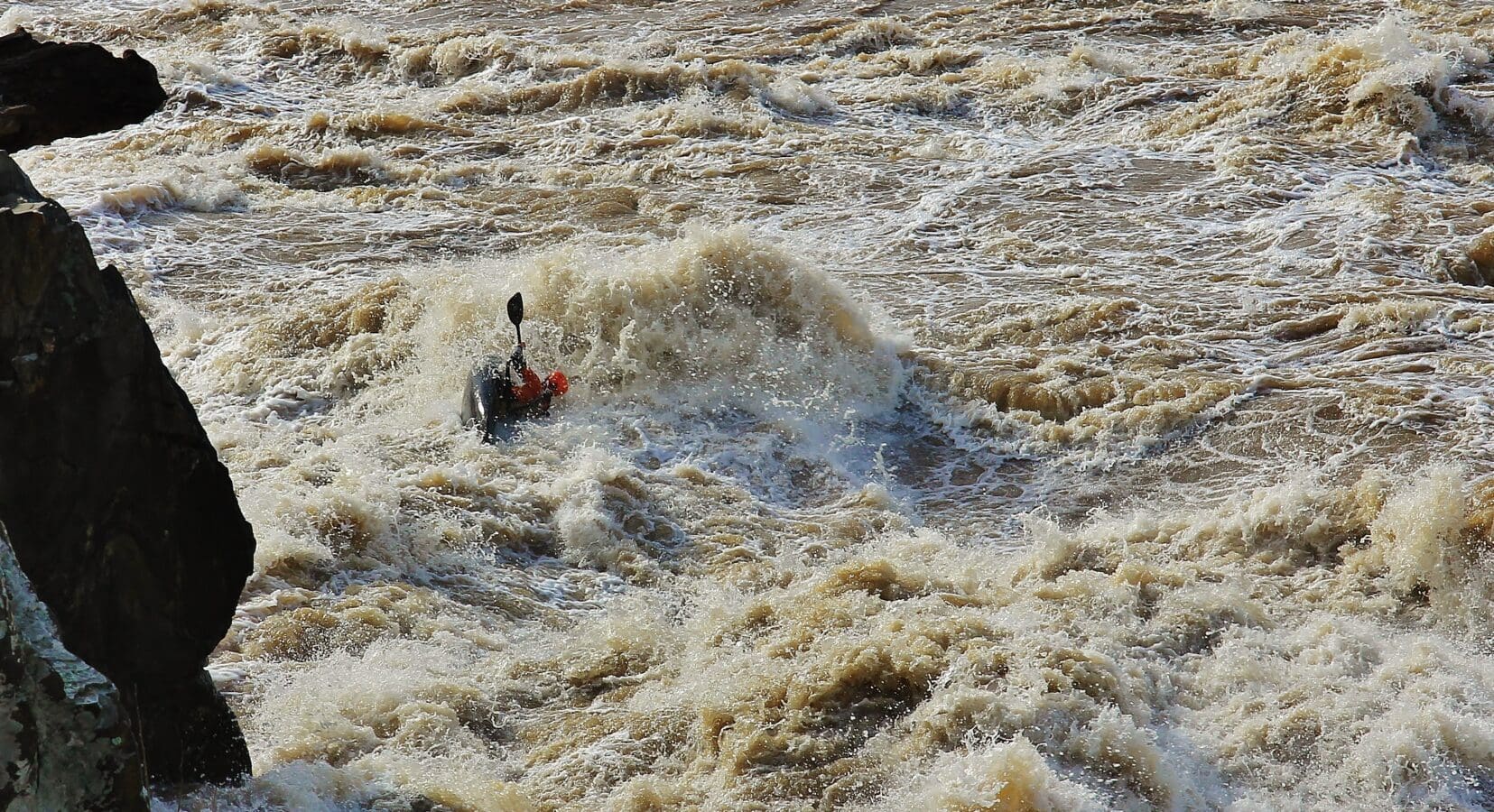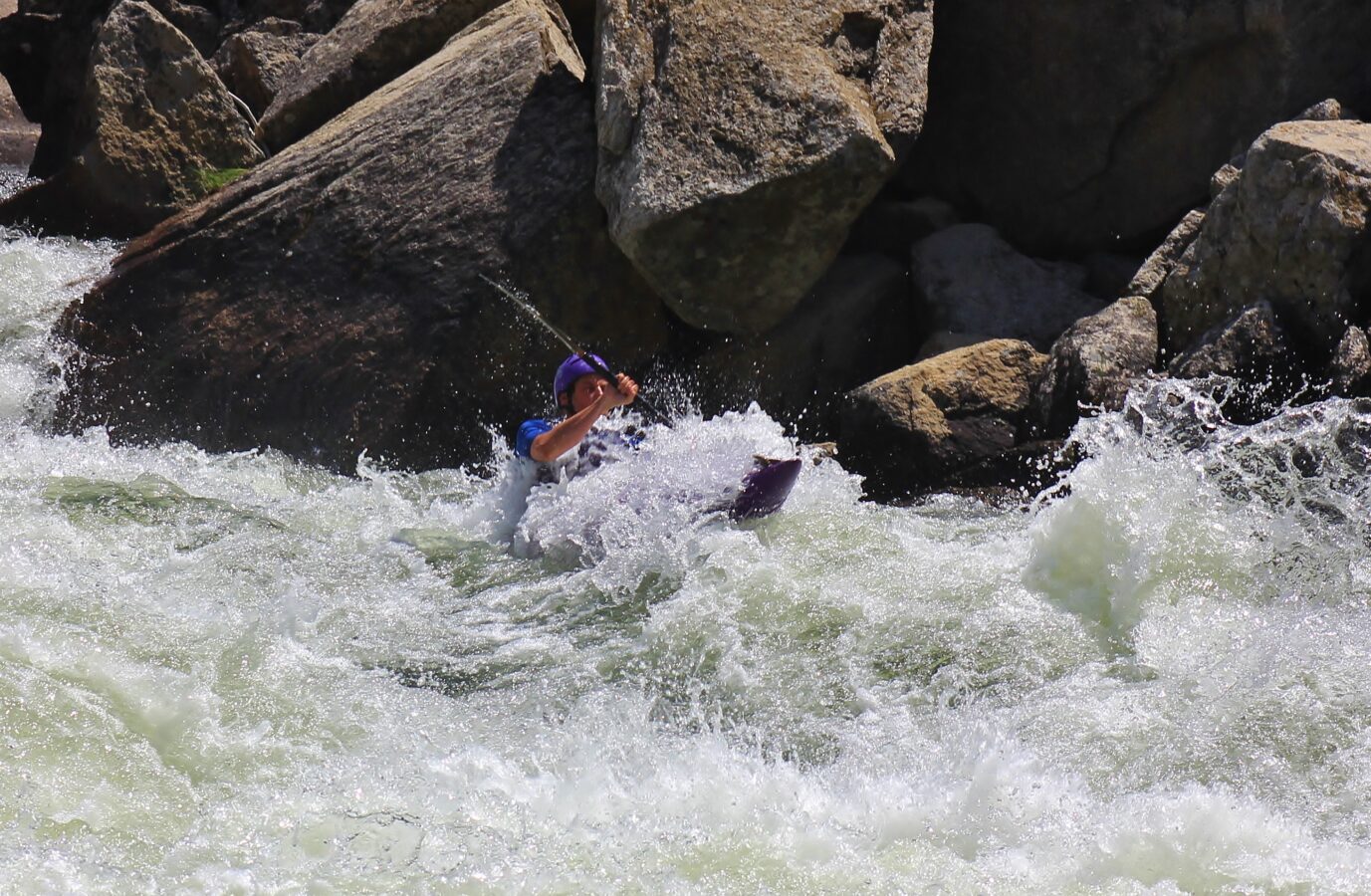
Can the Park Service Order a Paddler Off the Flooded Potomac River?
The Potomac River contains many regularly-paddled whitewater and non-whitewater sections. These sections include Great Falls of the Potomac and Mather Gorge of the Potomac. However, once in a while,the Potomac River near Washington, DC approaches flood level — which creates approximately 124,000 cubic feet per second of water (or more) rushing through the Potomac Gorge. The flooded Potomac River establishes many newly-formed, dynamic whitewater rapids within Great Falls and Mather Gorge below the Falls.
The Potomac River is also the primary training ground for many world-renowned whitewater kayakers and canoeists. In fact, one of the United States’ training centers for the sports of Canoe Slalom and Wildwater (Downriver) is located on the banks of the Potomac River. Thus, when the flooded Potomac River appears, many expert whitewater paddlers, including U.S. Olympians, often look forward to kayaking or canoeing on the flooded whitewater rapids.

However, when the Potomac River approaches flood level, the National Park Service (“NPS”) often closes river-access points. In fact, in one instance, NPS arrested a whitewater canoeist for paddling on the swollen Potomac River.
First and foremost, it is very important to note that the degree of skill necessary to safely paddle on the Potomac River at flood level is extremely higher than at normal or moderately-high levels. Only expert whitewater boaters with familiarity of high-volume whitewater should even consider paddling any flooded river, especially the flooded Potomac River. However, for those that have the necessary skills, once on the Potomac River, you are only subject to existing Maryland laws, and because no high-water use laws exist, no high-water use restrictions can be enforced.
Can the NPS ban these paddlers from the Potomac River when it approaches flood level?
 According to U.S. District Court Judge Peter Messitte in the 1996 case of NPS vs. David Hearn: Not yet. In 1996, U.S. Olympian Davey Hearn was paddling his whitewater canoe on the flooded Potomac River when he was called over to the river bank by NPS Police. Upon approaching the river shore, Davey Hearn was arrested for violating NPS’s “river closure” notice. Judge Messitte ultimately ruled that (1) because the Potomac River is controlled by Maryland, NPS could not order Hearn off of the Potomac River, and (2) even though NPS could arrest Hearn for being on the NPS-controlled river shore, because NPS essentially “brought him over” to the shore, NPS could not penalize Hearn for obeying their come-ashore request. Judge Messitte dismissed the charges against Davey Hearn.
According to U.S. District Court Judge Peter Messitte in the 1996 case of NPS vs. David Hearn: Not yet. In 1996, U.S. Olympian Davey Hearn was paddling his whitewater canoe on the flooded Potomac River when he was called over to the river bank by NPS Police. Upon approaching the river shore, Davey Hearn was arrested for violating NPS’s “river closure” notice. Judge Messitte ultimately ruled that (1) because the Potomac River is controlled by Maryland, NPS could not order Hearn off of the Potomac River, and (2) even though NPS could arrest Hearn for being on the NPS-controlled river shore, because NPS essentially “brought him over” to the shore, NPS could not penalize Hearn for obeying their come-ashore request. Judge Messitte dismissed the charges against Davey Hearn.
Maryland has control of the Potomac River, and Maryland can (with certain restrictions) make laws regarding the river’s use. NPS has control of the C&O Canal National Historic Park (which is adjacent to the Potomac River between Washington, DC and Cumberland, Maryland), and NPS can (with certain restrictions) make laws regarding park use. Maryland also allows NPS to enforce Maryland’s Potomac River laws.
Legal Result — Legal Rights of NPS
Thus, the result of this analysis is as follows:
NPS can (a) fine/arrest individuals from entering an NPS-controlled park for safety reasons (such as C&O National Historic Park) and (b) fine/arrest individuals for not obeying existing Maryland laws on the Potomac River (such as swimming and safety equipment).
However, Maryland has no laws regarding high-water paddling of the Potomac River (or any other river).
Thus, NPS cannot fine/arrest any individual for high-water use of the Potomac River (or any other Maryland-controlled river). This fact is true even though NPS is permitted to fine/arrest individuals for entering C&O Canal National Historic Park when NPS closes certain park areas for safety reasons (such as high water).
As stated above, only expert whitewater boaters with significant familiarity of serious whitewater should even consider paddling the flooded Potomac River. However, for those expert whitewater boaters that have the necessary skills, once on the Potomac River, you are only subject to existing Maryland laws, and because no high-water use laws exist, no high-water use restrictions can be enforced.
Longman & Van Grack regularly advises clients regarding sports and recreation legal issues within our Sports and Recreation Law Practice based in Maryland. In fact, Longman & Van Grack attorney Adam Van Grack has not only represented sports and recreation entities, but has also been a member of the boards of several sports safety and Olympic training nonprofits. Call us at (301) 291-5027 if you have any further questions or if you think we can help you out.
